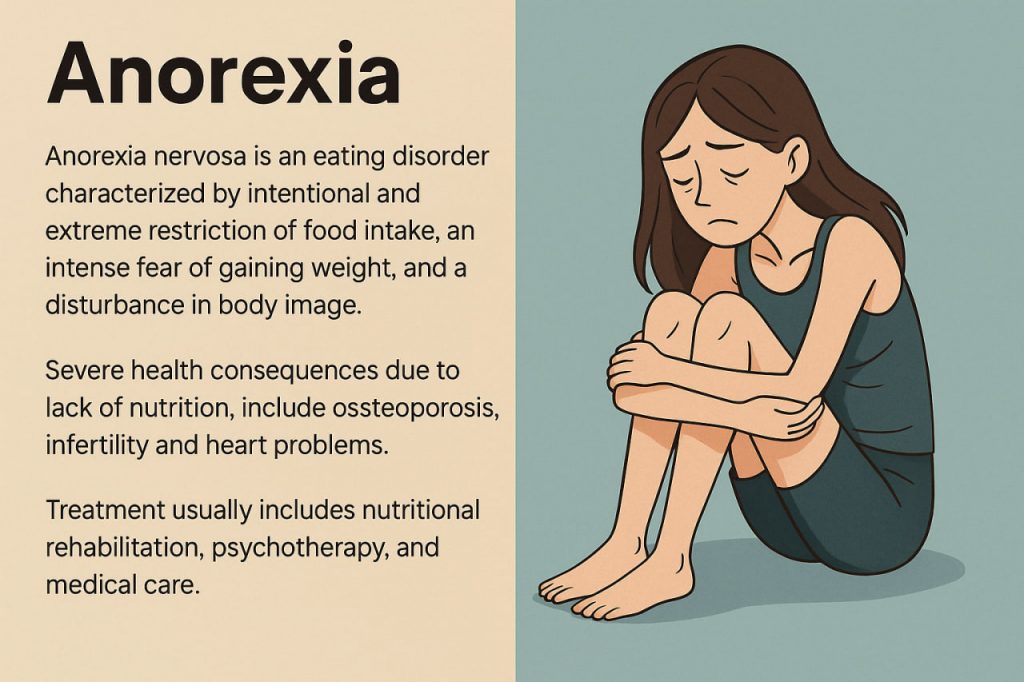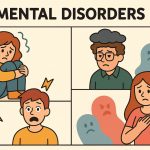Anorexia nervosa is a serious eating disorder that affects both physical and mental health. It is characterized by an intense fear of gaining weight, a distorted body image, and a persistent restriction of food intake. This condition often leads to extreme weight loss and can have life-threatening consequences if not properly treated. While anorexia is more common among young women, it can affect people of all ages and genders.
Causes and Risk Factors
The causes of anorexia are complex and usually involve a combination of psychological, biological, and social factors. Genetics may play a role, as some people are more predisposed to developing eating disorders. Psychological aspects, such as perfectionism, low self-esteem, or a desire for control, often contribute. Social influences, like unrealistic beauty standards promoted by media, can also trigger the disorder. Stressful life events, bullying, or family conflicts may further increase the risk.
Symptoms of Anorexia
People with anorexia often show visible signs of malnutrition, such as extreme thinness, fatigue, brittle hair and nails, and dry skin. They may also develop health problems like low blood pressure, irregular heartbeat, or weakened immunity. Behavioral symptoms include obsessive calorie counting, excessive exercising, avoiding meals, and denial of hunger. Importantly, even when severely underweight, individuals with anorexia may still perceive themselves as overweight due to distorted body image.
Health Consequences
Anorexia affects nearly every organ system in the body. Prolonged malnutrition can lead to heart failure, kidney damage, osteoporosis, infertility, and severe electrolyte imbalances. In many cases, the brain is also affected, resulting in difficulties with concentration, memory, and decision-making. Without treatment, anorexia can become fatal, making it one of the most dangerous psychiatric disorders in terms of mortality.
Diagnosis and Treatment
Doctors diagnose anorexia based on medical examinations, weight history, eating patterns, and psychological evaluation. Treatment requires a comprehensive approach. It often involves nutritional rehabilitation to restore healthy weight, psychotherapy to address distorted thoughts and behaviors, and medical care for complications. Family-based therapy has shown effectiveness, especially for adolescents. It is important to note that self-treatment is not advisable—professional help is essential.
Prevention and Support
Preventing anorexia involves promoting healthy relationships with food and body image. Schools, families, and communities can help by encouraging balanced nutrition, realistic views of beauty, and resilience against media pressures. If a loved one shows warning signs, early intervention is critical. Support from friends and family can improve recovery outcomes significantly.
Conclusion
Anorexia nervosa is not simply about food—it is a complex mental health disorder with severe physical consequences. Understanding its causes, recognizing the symptoms, and seeking early treatment are crucial steps toward recovery. With professional support and strong social networks, people with anorexia can regain their health and rebuild their lives.
Glossary
- Anorexia nervosa — a mental health disorder characterized by restricted eating and fear of gaining weight.
- Distorted body image — a false perception of one’s own body size or shape.
- Malnutrition — a medical condition caused by lack of proper nutrients.
- Electrolyte imbalance — dangerous disruption of minerals like sodium and potassium, affecting the heart and nerves.
- Psychotherapy — treatment involving mental health counseling to address behaviors and thoughts.


